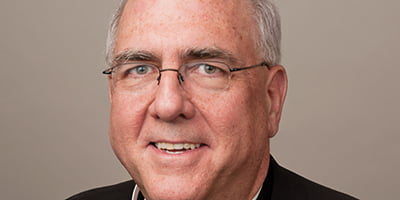by Archbishop Joseph F. Naumann
Pope Francis seems to always have a few surprises up his white sleeves.
Among his most recent unanticipated moves was his announcement of the extraordinary Jubilee of Mercy. He made his official announcement of the Jubilee Year on the vigil of Divine Mercy by describing Jesus as “the face of the Father’s mercy.” Pope Francis declared: “Jesus of Nazareth, by his words, actions and his entire person reveals the mercy of God.”
The Holy Father described mercy as “the bridge that connects God and man, opening our hearts to a hope of being loved forever despite our sinfulness.” The pope declared that part of the reason that he wants the entire church to contemplate the breadth and beauty of God’s mercy is so that we might become more effective witnesses of his compassionate love in the world.
Our Holy Father asked every diocesan church to designate a special “Holy Door of Mercy,” similar to the ones at the basilicas in Rome. This Holy Door or doors could be located at the cathedral and/or other churches of special significance.
The image of the open Holy Door in churches around the world is consistent with Pope Francis’ repeated plea that we not keep Jesus locked up in our churches, but take his merciful love into the community. In his message for the Jubilee of Mercy,
the Holy Father desires for many to come across the thresholds of our churches to experience the merciful love of Jesus.
Pope Francis reminds us that mercy is the key to understanding both the teaching of Jesus as well as the purpose of his ministry. An essential criterion for being Our Lord’s disciple is the capacity to give mercy to others. The Holy Father declared that pardoning the offenses of others is “an imperative from which we cannot excuse ourselves.” Pope Francis invites every member of the church to make a pilgrimage during the Jubilee of Mercy to one of the designated Holy Doors throughout the world so that “by crossing the threshold of the Holy Door, we will find the strength to embrace God’s mercy and dedicate ourselves to being merciful with others as the Father has been with us.”
The pope once again exhorts the church to go out to the peripheries, to the margins of the world to heal the wounds of those “who have no voice because their cry is muffled and drowned out by the indifference of the rich.”
Pope Francis pleads: “Let us open our eyes and see the misery of the world, the wounds of our brothers and sisters who are denied their dignity, and let us recognize that we are compelled to heed their cry for help! . . . May their cry become our own, and together may we break down the barriers of indifference that too often reign supreme and mask our hypocrisy and egoism.”
The pope asks that this Jubilee of Mercy be a time when the entire church reflects upon the corporal and spiritual works of mercy. The corporal works of mercy come directly from the Gospel: to feed the hungry, give drink to the thirsty, clothe the naked, welcome the stranger, heal the sick, visit the imprisoned and bury the dead. Similarly, the spiritual works of mercy (to counsel the doubtful, instruct the ignorant, admonish sinners, comfort the afflicted, forgive offenses, bear patiently those who do us ill, and pray for the living and the dead) are also integral to living the Christian life. For your personal preparation for the Jubilee of Mercy, I encourage you to select both one corporal work of mercy and one spiritual work of mercy that you want to commit yourself to begin living or to strive to live more fully.
Pope Francis expresses a particular desire that, during this Jubilee of Mercy, we rekindle a love for the sacrament of reconciliation or penance. He challenges confessors to be first
good penitents so that, as recipients of God’s mercy, we might become better ministers of God’s mercy.
The Holy Father expressed his intention to send special “Missionaries of Mercy” throughout
the world. Pope Francis envisions these missionaries of mercy to be “above all, living signs of the Father’s readiness to welcome those in search of his pardon. They will be missionaries
of mercy because they will be facilitators of a truly human encounter, a source of liberation, rich with the responsibility for overcoming obstacles and taking up the new life of Baptism again.”
Pope Francis even made special appeals — to those involved with criminal organizations as well as those who perpetrate or participate in corruption — to open their hearts to encounter God’s mercy and change their lives. The pope also expressed a hope that the Jubilee of Mercy will “foster an encounter” with people of other faiths who share our awareness and gratitude for God’s mercy.
The Jubilee of Mercy will begin on Dec. 7, the Vigil for the solemnity of the Immaculate Conception, which coincides with the 50th anniversary of the closing of the Second Vatican Council. The Jubilee will conclude on Nov. 20, 2016, the solemnity of Christ the King.
We have a lot to do in the archdiocese to prepare for our local observance of the Jubilee of Mercy. Please keep our preparations in your prayers! It is exciting to consider all that the
Lord wishes to accomplish through this special time when the entire church will be contemplating the face of Jesus, the face of mercy!


